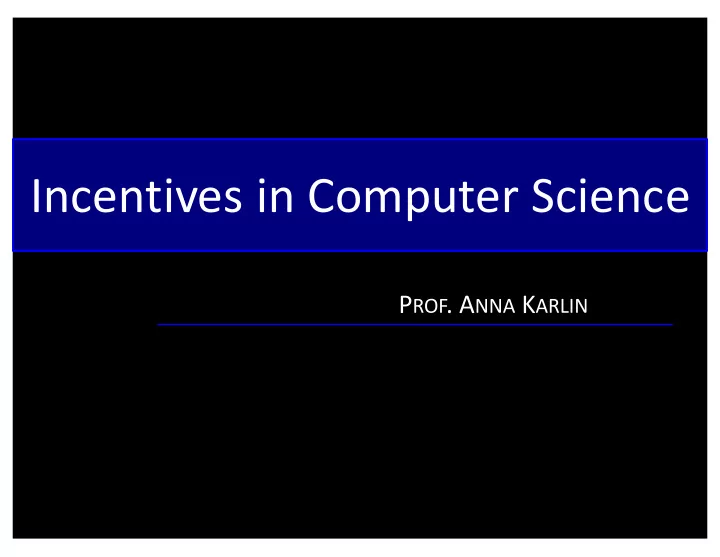

Incentives in Computer Science P ROF . A NNA K ARLIN
Your professor and TA Anna Aditya Karlin Saraf karlin@cs sarafa@cs Office: CSE 586 Office hours: by appointment Office hours: Tuesdays, 5:30-6:20 pm
An Example Classical Optimization Problem: Maximum Weighted Matching Input: Weighted Bipartite Graph Output: Matching that maximizes the sum of matched edge weights. 2 3 1 2 5 1
An Example Classical Optimization Problem: Maximum Weighted Matching Input: Weighted Bipartite Graph Output: Matching that maximizes the sum of matched edge weights. 2 3 1 2 5 1
Example Application Selling advertising slots A search engine has advertising slots for sale • Advertisers are willing to pay different amounts to have their ad • shown in a particular slot advertisers slots 2 3 1 2 5 1 Optimal Search Engine Revenue = maximum weighted matching
Private Values Algorithm must solicit values • Advertisers may lie to get a better deal • advertisers slots 2 3 1 2 5 1
Private Values • Algorithm must solicit values • Advertisers may lie to get a better deal advertisers slots 2 3 1 2 5 è 3 1
Private Values • Algorithm must solicit values • Advertisers may lie to get a better deal advertisers slots 2 3 1 2 5 1 What if all advertisers speculate?
Big Picture Many problems where input is private data of agents who will act selfishly to promote best interests Resource allocation • Routing and congestion control • Electronic commerce • Fundamental Question: How do we optimize in a strategic world? Use ideas from game theory and economics.
Game Theory Game Theory studies the interaction between competing or cooperating individuals. Key notion: equilibrium A LGORITHMIC G AME T HEORY Newish field at interface between theoretical computer science and game theory. Motivated by new applications in ecommerce, network applications, large scale resource • allocation problems, myriad of nontraditional, computer-run auctions, etc. addresses fundamental problems about auctions, networks and human • behavior using the tools of game theory, economics and algorithm design and analysis.
Companies/systems that can be Problems that can be studied studied from this perspective from this perspective • eBay, Amazon Auction design and analysis • • Google, Yahoo!, Reputation systems • Microsoft Recommendation systems • Crowdsourcing • Facebook • Resource allocation • • Twitter problems • Uber, Lyft Routing and congestion • • airBnb control Creating incentives in social • • Quora and financial systems • Farecast Prediction markets • • Wikipedia … • • …
Themes • Designing systems for strategic participants with good performance. • Games that arise in the wild: when is selfish behavior benign? • How do strategic players reach an equilibrium? Or do they? • Goal: to expose you to a different way to think.
Tentative list of topics • Matching and allocation problems • Intro to game theory, Nash equilibrium, etc. • Markets, market-clearing prices, first welfare theorem • Auctions (ads, spectrum) • Price of anarchy • Incentives in cryptocurrencies • Online learning in markets • Scoring rules and prediction markets • Voting
Note… This is a theoretical class. E XPECTED BACKGROUND • “mathematical maturity” • Basics of probability, some background in algorithm design and analysis. • I do not expect you to know any game theory or economics.
The nuts and bolts C OURSE WEBSITE http://www.cs.washington.edu/csep590b G RADING 60% homework 40% project
About 4 homeworks of each type T HEORETICAL EXERCISES P ROGRAMMING P ROJECTS First homework is already posted, Linked from web page (on Canvas)
Project M ANY P OSSIBILITIES : • Pick a company and some aspect of their business and study it game theoretically. • Study some research papers. • Design and run some interesting game theoretic experiments. Formulate hypotheses.
Today’s lecture • Covers some of the major results that resulted in the awarding of the 2012 Nobel Prize in economics to Lloyd Shapley and Al Roth • “The Prize concerns a central economic problem: how to match different agents as well as possible. For example, students have to be matched with schools, and donors of human organs with patients in need of a transplant. How can such matching be accomplished as efficiently as possible? What methods are beneficial to what groups? The prize rewards two scholars who answered these questions on a journey from abstract theory on stable allocations to practical design of market institutions.”
Recommend
More recommend